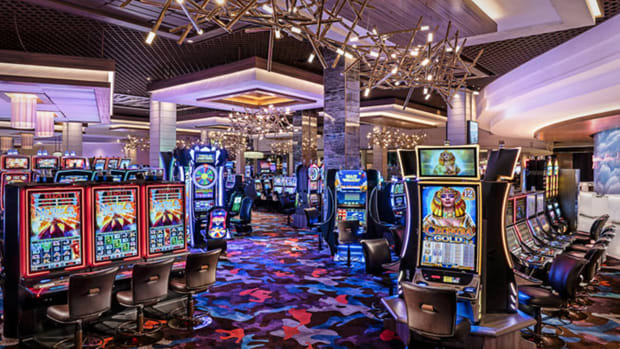Las Vegas and the cruise industry have an overlapping customer base. Many of the people who visit Sin City and a lot of the folks who take cruises like to gamble.
That's likely why Caesars Entertainment (CZR) often has promotions where guests who have hit some of the higher tiers of their loyalty program can get a free Norwegian Cruise Line (NCLH) cruise simply for staying in Las Vegas for a few days. Royal Caribbean International (RCL) also has a deal with a casino chain as MGM Resorts International (MGM) matches the cruise line's loyalty program status.
It's easy to see why cruise lines and Las Vegas casinos would work together. Both are vacation options where gambling, dining, and entertainment play a big part in people's trips. If you enjoy one of Caesars or MGM's massive resort casinos there's a pretty good chance you would also like one of Royal Caribbean, Carnival, or Norwegian's cruise ships, which are basically floating versions of Las Vegas resorts.
Since the covid-19 pandemic hit, however, two segments that are important to both the cruise industry and Las Vegas have stayed away. Now, those customers appear to be coming back to Las Vegas and that should be welcome news for the cruise industry.

Image source: Palms Casino
Older, International Visitors Make a Las Vegas Return
Older customers have generally been a core part of the audience for both Las Vegas and cruise lines. That 55-and-over population, however, has been slower to return to pre-covid activities because of their greater vulnerability to the virus.
Even when vaccines became common, the 55+ segment of the audience has been more cautious about travel than younger customers. That makes sense as many people in that age group have underlying conditions or other concerns that make contracting covid more dangerous than it would be for a younger person.
International travelers, until fairly recently, faced covid testing to both enter and leave the United States. That was an added hassle that encouraged many of those customers to opt against traveling abroad. In addition, the cruise lines required covid tests to board their ships.
Now, those protocols have been dropped on some sailings and travel rules have generally returned to what they were in 2019. In a broad sense, covid has become less of a concern based on fewer people being hospitalized or getting really sick. That has led to good news in Las Vegas, which also bodes well for the cruise industry.
Caesar's CEO Tom Reeg detailed the changes during his company's second-quarter earnings call.
"And finally, results in our 55-plus segment, Las Vegas were up for the first time over 2019 since COVID began, and we're beginning to see a noticeable return to the market from international travelers," Reeg said.
That's a sentiment that CFO Anthony Carano repeated later in the call.
"We remain encouraged regarding improving group and convention trends in Las Vegas, the return of the international consumer as well as the potential for the full recovery of our older demographic consumer, which has been the most impacted to covid-19," he added.
Cruise Lines Are Well-Positioned for a Rough Economy
When the economy goes through a down period, many people are more cautious with their vacation dollars. That's actually a positive for the cruise industry as cruises are a mostly all-inclusive experience. Royal Caribbean, for example, offers all your meals, basic drinks, and nearly all entertainment for the price of your ticket.
That, along with other factors, has driven a strong recovery for Royal Caribbean, CEO Jason Liberty said during the cruise line's second-quarter earnings call.
"The combination of consumers' strong propensity to experience in travel, accelerating demographic trends, which are pulling in more bucket list and multigenerational travel, a very compelling value proposition and a strong preference for our brand is translating into strengthening demand," he said.
And, if the company sells cabins at lower prices to get people onboard, it has been more than making that up in onboard revenue.
"This outperformance in Q2 versus our expectations was driven by continued strength in our onboard revenue and accelerating load factors, which hit nearly 90% in June and delivered 82% for the quarter," he said. "This combination led us to achieving higher total revenue per guest versus 2019 levels."







